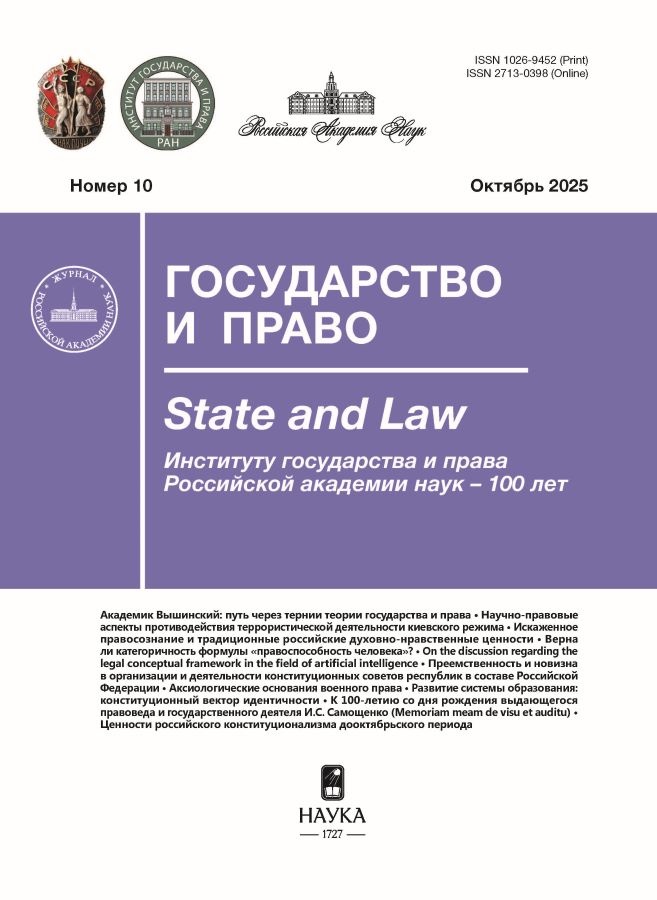On the Discussion Regarding the Legal Conceptual Framework in the Field of Artificial Intelligence
- Autores: Naumov V.B.1, Kamalova G.G.2
-
Afiliações:
- Institute of State and Law of the Russian Academy of Sciences
- Udmurt State University
- Edição: Nº 10 (2025)
- Páginas: 92-97
- Seção: Discussions and debates
- URL: https://freezetech.ru/1026-9452/article/view/693381
- DOI: https://doi.org/10.31857/S1026945225100073
- ID: 693381
Citar
Texto integral
Resumo
The research is devoted to the topical issue of the formation of the legal conceptual framework in connection with the regulation of public relations in the field of development and implementation of artificial intelligence. The research uses general scientific methods of analysis, synthesis, description, as well as formal logical and comparative legal methods on the basis of system approach. The research addresses existing legal approaches to the definition of artificial intelligence as a generic concept in the relevant subject area that are enshrined in strategic planning documents, Russian and foreign legislation, technical regulation documents and scientific sources. On the basis of the presented research, the authors substantiate the advisability of understanding artificial intelligence as a type of information system with certain characteristics. The authors have found that the autonomy of the system, collection and assessment of digital data, self-learning and other characteristics of artificial intelligence are secondary, but at the same time they are also significant for legal regulation. The research has made it possible to draw conclusions about the advisability of forming an ordered system of legal norms-definitions in the area under consideration worldwide and in Russia.
Palavras-chave
Sobre autores
V. Naumov
Institute of State and Law of the Russian Academy of Sciences
Autor responsável pela correspondência
Email: nau@russianlaw.net
10 Znamenka str., Moscow, Russia
G. Kamalova
Udmurt State University
Email: gulfia.kamalova@gmail.com
1, bld. 2 Universitetskaya str., Izhevsk, Russia
Bibliografia
- Arkhipov V. V., Braginets A. Yu., Gracheva A. V., Naumov V. B. On the way to the legal definition of artificial intelligence // Information Law. 2021. No. 4. Pp. 22–26 (in Russ.).
- Humerick M. Taking AI Personally: How the EU must learn to balance the interests of personal data and privacy and artificial intelligence // Santa Clara High Technology Law Journal. 2018. Vol. 34. No. 4. URL: https://digitalcommons.law.scu.edu/cgi/viewcontent.cgi?article=1633&context=chtlj (accessed: 14.02.2025).
- Morkhat P. M. Artificial intelligence: a legal view. М., 2017. Pp. 39, 40 (in Russ.).
- Naumov V. B., Kamalova G. G. Issues of building legal definitions in the field of artificial intelligence // Proceedings of the Institute of State and Law of the Russian Academy of Sciences. 2020. Vol. 15. No. 1. P. 85 (in Russ.).
- Ponkin I. V., Redkina A. I. Artificial intelligence from the legal perspective // Herald of the Peoples’ Friendship University of Russia. Ser.: Legal Sciences. 2018. Vol. 22. No. 1. Pp. 94, 95 (in Russ.).
- Pospelov D. A. Fantasy or science: on the way to artificial intelligence. M., 1982. P. 224 (in Russ.).
- Rogatkin D. Will artificial intelligence lose consciousness? // Science and Life. 2018. No. 10 (in Russ.).
- Smolin D. V. Introduction to artificial intelligence: lecture notes. М., 2004. Pp. 15–17 (in Russ.).
Arquivos suplementares










